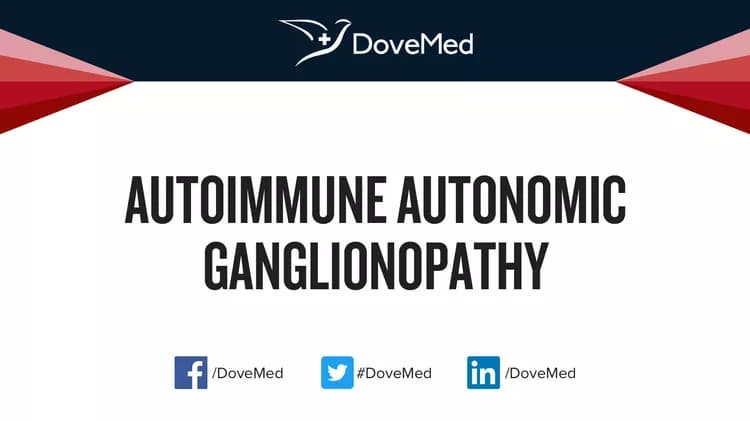What are the other Names for this Condition? (Also known as/Synonyms)
- AAG (Autoimmune Autonomic Ganglionopathy)
- Autoimmune Autonomic Ganglionitis
- Autoimmune Autonomic Neuropathy
What is Autoimmune Autonomic Ganglionopathy? (Definition/Background Information)
- Autoimmune Autonomic Ganglionopathy (AAG) is a rare autoimmune disorder characterized by dysfunction of the autonomic ganglia, which are clusters of nerve cells responsible for regulating the involuntary functions of the body
- Autoimmune Autonomic Ganglionopathy leads to impairment in autonomic function, affecting various systems, such as the cardiovascular, gastrointestinal, and urinary systems. It is classified as a form of dysautonomia. The diagnosis of AAG involves clinical evaluation, autonomic testing, and identification of autoantibodies
- The treatment may involve immunomodulatory therapies, symptomatic management, and lifestyle adjustments. The prognosis of Autoimmune Autonomic Ganglionopathy varies; some individuals may experience improvement with treatment, while others may face ongoing challenges in symptom control and management
Who gets Autoimmune Autonomic Ganglionopathy? (Age and Sex Distribution)
- Autoimmune Autonomic Ganglionopathy can affect individuals of any age and gender
- However, it is more commonly observed in adults, with a slightly higher incidence in females
- The condition may occur worldwide, affecting individuals of all racial and ethnic groups
What are the Risk Factors for Autoimmune Autonomic Ganglionopathy? (Predisposing Factors)
- The exact risk factors for Autoimmune Autonomic Ganglionopathy are not well-defined
- However, certain factors may contribute to its development, including a personal or family history of autoimmune disorders
It is important to note that having a risk factor does not mean that one will get the condition. A risk factor increases one’s chances of getting a condition compared to an individual without the risk factors. Some risk factors are more important than others.
Also, not having a risk factor does not mean that an individual will not get the condition. It is always important to discuss the effect of risk factors with your healthcare provider.
What are the Causes of Autoimmune Autonomic Ganglionopathy? (Etiology)
The exact cause of Autoimmune Autonomic Ganglionopathy (AAG) is unknown.
- It is believed to be an autoimmune condition in which the body's immune system mistakenly attacks the autonomic ganglia, resulting in inflammation and dysfunction
- AAG is a rare disorder in which the body's immune system mistakenly attacks the autonomic ganglia (clusters of nerve cells responsible for autonomic function regulation)
- This results in autonomic nervous system dysfunction and a wide range of symptoms, including orthostatic hypotension, gastrointestinal issues, and temperature dysregulation
What are the Signs and Symptoms of Autoimmune Autonomic Ganglionopathy?
The signs and symptoms of Autoimmune Autonomic Ganglionopathy may be mild or severe and can vary from one individual to another. These may include:
- Orthostatic hypotension: Drop in blood pressure upon standing, leading to dizziness or fainting
- Gastrointestinal symptoms such as bloating, constipation, or diarrhea
- Urinary dysfunction, including urinary retention or urinary incontinence
- Cardiovascular abnormalities, including irregular heart rate or cardiac arrhythmias
- Sweating abnormalities such as excessive sweating or lack of sweating
- Pupillary abnormalities that include changes in pupil size or reactivity
How is Autoimmune Autonomic Ganglionopathy Diagnosed?
A diagnosis of Autoimmune Autonomic Ganglionopathy may involve the following tests and exams:
- Medical history and symptom assessment: The physician may inquire about the individual's symptoms and medical history
- Autonomic function tests: Various tests are performed to evaluate autonomic function, including heart rate variability tests, tilt table testing, and thermoregulatory sweat tests
- Antibody testing: Blood tests may be conducted to detect the presence of specific antibodies associated with autoimmune autonomic neuropathies
- Laboratory tests and radiological imaging studies, as needed
Many clinical conditions may have similar signs and symptoms. Your healthcare provider may perform additional tests to rule out other clinical conditions to arrive at a definitive diagnosis.
What are the possible Complications of Autoimmune Autonomic Ganglionopathy?
The complications of Autoimmune Autonomic Ganglionopathy (AAG) may include:
- Increased risk of falls and injuries: Orthostatic hypotension and other autonomic dysfunctions can increase the risk of falls and injuries
- Impaired quality of life: The symptoms of AAG can significantly impact an individual's daily activities and overall well-being, leading to a reduced quality of life
How is Autoimmune Autonomic Ganglionopathy Treated?
The treatment of Autoimmune Autonomic Ganglionopathy may involve the following measures:
- Immunomodulatory therapies: Medications such as corticosteroids, intravenous immunoglobulin (IVIG), or plasma exchange may be prescribed to suppress the immune response and reduce inflammation
- Symptomatic management: Treatment approaches aim to alleviate specific symptoms, such as using medications to regulate blood pressure or addressing gastrointestinal or urinary symptoms
How can Autoimmune Autonomic Ganglionopathy be Prevented?
- As the exact cause of Autoimmune Autonomic Ganglionopathy is unknown, specific preventive measures are currently unavailable
- However, maintaining a healthy lifestyle, managing stress, and following a treatment plan can help manage symptoms and minimize complications
What is the Prognosis of Autoimmune Autonomic Ganglionopathy? (Outcomes/Resolutions)
The prognosis of Autoimmune Autonomic Ganglionopathy can vary depending on the individual and the severity of the condition.
- With appropriate treatment and symptom management, many individuals experience improvement in their symptoms and quality of life
- However, some cases may be chronic and require long-term management
Additional and Relevant Useful Information for Autoimmune Autonomic Ganglionopathy:
The following DoveMed website link is a useful resource for additional information:
Related Articles
Test Your Knowledge
Asked by users
Related Centers
Related Specialties
Related Physicians
Related Procedures
Related Resources
Join DoveHubs
and connect with fellow professionals


0 Comments
Please log in to post a comment.